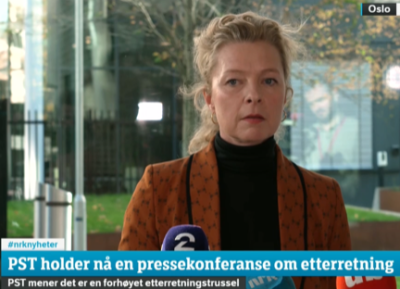Just as Russia’s ambassador in Oslo was complaining of espionage “hysteria” against Russians in Norway last week, Norwegian police were closing in on an alleged Brazilian researcher at the University of Tromsø. Police intelligence agency PST thinks he’s actually a Russian spy, and state broadcaster NRK reported on his arrest and court deportation hearing on Tuesday.

“We have asked that a Brazilian researcher at the University of Tromsø be sent out of Norway because we believe he represents a threat to fundamental national interests,” Hedvig Moe, deputy director of PST, told NRK.
Norway’s Ministry of Justice and Preparedness, which is responsible for immigration issues in addition to the police and court system, had issued a warning about the man on October 20, the same day NRK aired an interview with the Russian ambassador to Norway. NRK reported that the man, a Brazilian citizen, was arrested while on his way to work in the northern city of Tromsø on Monday and his case is being handled as an immigration offense. The local court ordered that he be held in custody for four weeks while an investigation into his background proceeds.
PST views the man as a so-called “illegalist,” someone who operates under an assumed identity as an ordinary resident but who actually works for a foreign intelligence service. NRK reported that he came to Norway as a researcher at the University of Tromsø in the fall of last year, allegedly to study the northern region and hybrid threats.
Moe told NRK that PST is concerned the man has acquired a network of contacts and information on Norwegian policy in the far north. “Even though neither this network nor the information bit for bit isn’t a threat to national security, we are concerned the information can be misused by Russia,” she said.
Moe added that PST, which warned of Russian espionage just last week, has been working in cooperation with other countries’ national security services. “International cooperation is important when working with illegalists because they are very careful, and often good at shielding themselves and working over long periods of time in the countries where they operate,” Moe said.

Russia, according to PST, is known for using such agents in their intelligence operations but it’s seldom their intelligence gathering is revealed. Moe said “they work on a very long-term basis and have a life history that’s built up over time. They don’t as a rule have any direct espionage assignment. In many cases they’re instead used to facilitate espionage, including acquiring agents, networks and access to sensitive information.”
Newspaper VG reported Tuesday that some of the man’s colleagues at the university were “shocked” by his arrest. Dag Rune Olsen, rector at the University of Tromsø that also uses the name “Norway’s Arctic University,” told NRK that he’d been informed of the researcher’s arrest “and will let this be handled by the police in a secure manner.” All other questions were referred to the police.
“Illegalists operate with another identity than what they were born with,” Moe said. “They need false identity papers, often those of a dead person. We know that Russia earlier has used South American identities, and in this case we believe they have used a Brazilian identify.” According to PST, South American countries are often used because many lack a central population register.
The alleged spy’s arrest comes after a series of other arrests of Russian citizens suspected of using drones to gather information about Norwegian power plants, refineries, offshore-related industry and other strategic infrastructure. Russian Ambassador Teymuraz Ramishvili, who’s been stationed in Oslo for the past six years, agreed to an interview with NRK last week, during which he referred to the arrests as “discriminatory.” He claimed it’s legal for Russians to operate drones in Norway, and that it’s common for tourists to travel with drones.
Foreign Minister Anniken Huitfeldt, however, claims Russian drone operations defy sanctions against Russia that close air space to Russian use. She stressed that Russians are only allowed to fly helicopters in and out of their enclave of Barentsburg on Svalbard.
At least two of the Russians arrested for possession of drones have since been ordered released. Police have appealed, however, and the Russians remain in custody.
Fishing agreement secured despite more drone alarms
The Russian ambassador claimed his country “has not done anything to harm the bilateral relationship” with Norway, but complained Norway has been “behaving in an unfriendly manner” towards Russia. On Tuesday, however, the two countries agreed on a new fisheries agreement for 2023. Russia and Norway have long cooperated on fishing quotas along with search and rescue operations in the Arctic.
“It’s good that we have entered into a new fisheries agreement with Russia, even though we are in an extraordinary situation,” said Fisheries Minister Bjørnar Skjæran, referring to Norway’s strong opposition to Russia’s war on Ukraine.
Norwegian defense forces responded during the weekend, meanwhile, to reports of more drones flying around the Åsgard field in the North Sea. The Coast Guard also sent out a ship to monitor a Russian ice breaker, the Yury Topchev, that was idling in the water near Norway’s largest gas field, Ormen Lange. Norway’s offshore installations and pipelines are now viewed as sabotage targets. The Russian vessel’s extended stay in the area, however, was linked to bad weather farther north.
NewsinEnglish.no/Nina Berglund

